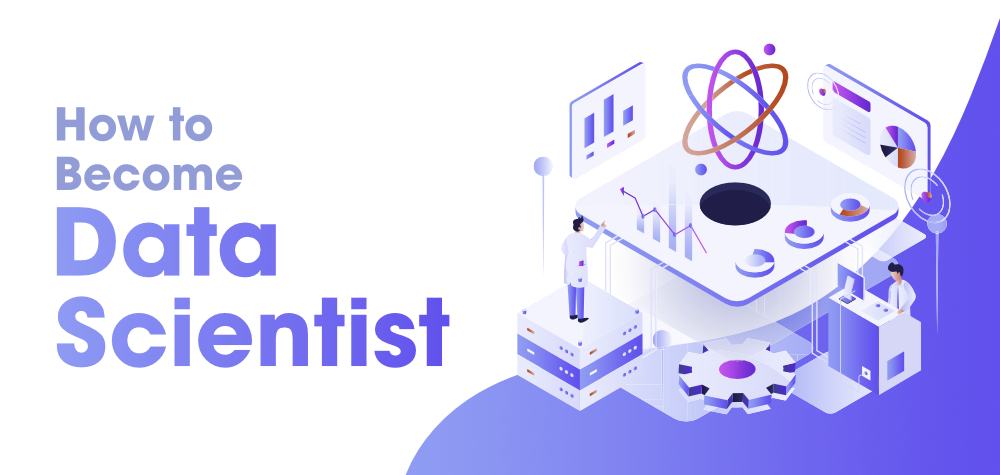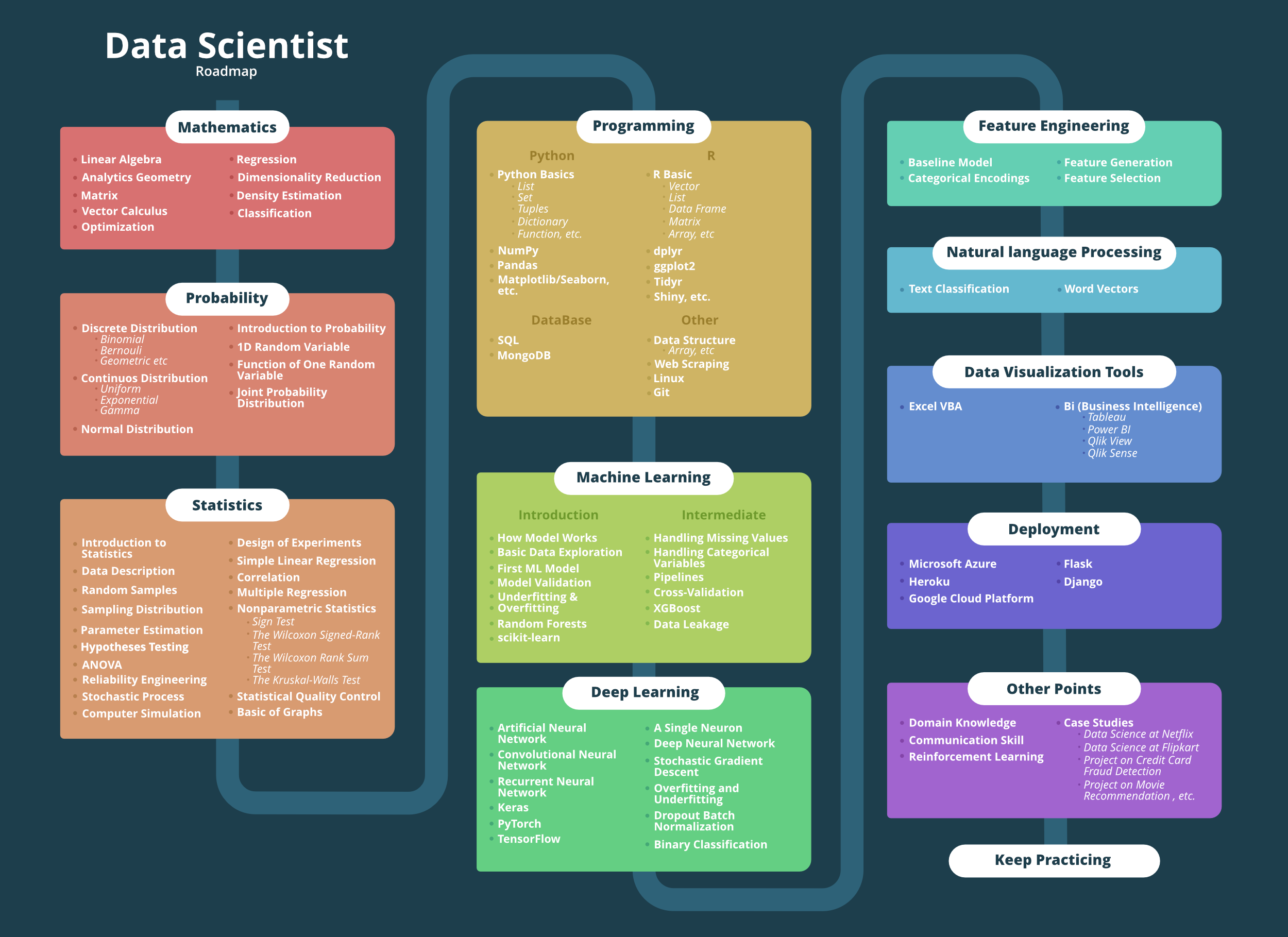How to Become Data Scientist – A Complete Roadmap
According to the Harvard Business Review, Data Scientist is “The Sexiest Job of the 21st Century”. Is this not enough to know more about data science! In the world of data space, the era of Big Data emerged when organizations are dealing with petabytes and exabytes of data. It became very tough for industries for the storage of data until 2010. Now when popular frameworks like Hadoop and others solved the problem of storage, the focus is on processing the data. And here Data Science plays a big role. Nowadays the growth of data science has been increased in various ways and so one should be ready for the future by learning what data science is and how can we add value to it.

What is Data Science?
So now the very first question arises is, “What is Data Science?” Data science means different things for different people, but at its gist, data science is using data to answer questions. This definition is a moderately broad definition, and that’s because one must say data science is a moderately broad field!
Data science is the science of analyzing raw data using statistics and machine learning techniques with the purpose of drawing conclusions about that information.
So briefly it can be said that Data Science involves:
- Statistics, computer science, mathematics
- Data cleaning and formatting
- Data visualization
Nowadays it is known to everyone that how popular is Data Science. Now the questions that arise are, Why Data Science(Decide the Goal First?), how to start? Where to start? What topics one should cover? etc, etc. Do you need to learn all the concepts from a book or you should go with some online tutorials or you should learn Data Science by doing some projects on it? So in this article, we are going to discuss all these things in detail.
Why Data Science? (Decide the Goal First?)
So before jumping into the complete Roadmap of Data Science one should have a clear goal in his/her mind that why he/she wants to learn Data Science? Is it for the phrase “The Sexiest Job of the 21st Century“? Is it for your college academic projects? or is it for your long-term career? or do you want to switch your career to the data scientist world? So first make a clear goal. Why do you want to learn Data Science? For example, if you want to learn Data Science for your college Academic projects then it’s enough to just learn the beginner things in Data Science. Similarly, if you want to build your long-term career then you should learn professional or advanced things also. You have to cover all the prerequisite things in detail. So it’s on your hand and it’s your decision why you want to learn Data Science.
How to Learn Data Science?
Usually, data scientists come from various educational and work experience backgrounds, most should be proficient in, or in an ideal case be masters in four key areas.
- Domain Knowledge
- Math Skills
- Computer Science
- Communication Skill
Domain Knowledge
Most people thinking that domain knowledge is not important in data science, but it is very important. Let’s take an example: If you want to be a data scientist in the banking sector, and you have much more information about the banking sector like stock trading, know about finance, etc. so this is going to be very beneficial for you and the bank itself will give more preference to these type of applicants more than a normal applicant.
Math Skills
Linear Algebra, Multivariable Calculus & Optimization Technique, these three things are very important as they help us in understanding various machine learning algorithms that play an important role in Data Science. Similarly, understanding Statistics is very significant as this is a part of Data analysis. Probability is also significant to statistics and it is considered a prerequisite for mastering machine learning.
Computer Science
There is much more to learn in computer science. But when it comes to the programming language one of the major questions that arise is:
Python or R for Data Science?
There are various reasons to choose which language for Data Science as both have a rich set of libraries to implement the complex machine learning algorithm, visualization, data cleaning. Please refer to R vs Python in Data Science to know more about this.
But my recommendation is one must have knowledge of both the programming language to become a successful data scientist.
Apart from the programming language the other computer science skills you have to learn are:
- Basics of Data Structure and Algorithm
- SQL
- MongoDB
- Linux
- Git
- Distributed Computing
- Machine Learning and Deep Learning, etc.
Communication Skill
It includes both written and verbal communication. What happens in a data science project is after drawing conclusions from the analysis, the project has to be communicated to others. Sometimes this may be a report you send to your boss or team at work. Other times it may be a blog post. Often it may be a presentation to a group of colleagues. Regardless, a data science project always involves some form of communication of the projects’ findings. So it’s necessary to have communication skills for becoming a data scientist.
Learning Resources
There are plenty of resources and videos available online and it’s confusing for someone where to start learning all the concepts. Initially, as a beginner, if you get overwhelmed with so many concepts then don’t be afraid and stop learning. Have patience, explore, and stay committed to it.
Some useful learning resource links available at GeeksforGeeks:
A Roadmap to Learn
Start with the Overview of Data Science. Read some Data Science related blogs and also research some Data Science-related things. For example read blogs on Introduction to Data Science, Why to choose data science as a career, Industries That Benefits the Most From Data Science, Top 10 Data Science Skills to Learn in 2020, etc., etc., and make a complete mind makeup to start your journey on Data Science. Make yourself self-motivated to learn Data Science and build some awesome projects on Data Science. Do it regularly and also start learning one by one new concept on Data Science. It will be very better to join some workshops or conferences on Data Science before you start your journey. Make your goal clear and move on toward your goal.
1) Mathematics
Math skill is very important as they help us in understanding various machine learning algorithms that play an important role in Data Science.
- Part 1:
- Linear Algebra
- Analytic Geometry
- Matrix
- Vector Calculus
- Optimization
- Part 2:
- Regression
- Dimensionality Reduction
- Density Estimation
- Classification
2) Probability
Probability is also significant to statistics, and it is considered a prerequisite for mastering machine learning.
- Introduction to Probability
- 1D Random Variable
- The function of One Random Variable
- Joint Probability Distribution
- Discrete Distribution
- Continuous Distribution
- Uniform
- Exponential
- Gamma
- Normal Distribution (Python | R)
3) Statistics
Understanding of Statistics is very significant as this is a part of Data analysis.
- Introduction to Statistics
- Data Description
- Random Samples
- Sampling Distribution
- Parameter Estimation
- Hypotheses Testing (Python | R)
- ANOVA (Python | R)
- Reliability Engineering
- Stochastic Process
- Computer Simulation
- Design of Experiments
- Simple Linear Regression
- Correlation
- Multiple Regression (Python | R)
- Nonparametric Statistics
- Sign Test
- The Wilcoxon Signed-Rank Test (R)
- The Wilcoxon Rank Sum Test
- The Kruskal-Wallis Test (R)
- Statistical Quality Control
- Basics of Graphs
4) Programming
One needs to have a good grasp of programming concepts such as Data structures and Algorithms. The programming languages used are Python, R, Java, Scala. C++ is also useful in some places where performance is very important.
References:
5) Machine Learning
ML is one of the most vital parts of data science and the hottest subject of research among researchers so each year new advancements are made in this. One at least needs to understand basic algorithms of Supervised and Unsupervised Learning. There are multiple libraries available in Python and R for implementing these algorithms.
- Introduction:
- How Model Works
- Basic Data Exploration
- First ML Model
- Model Validation
- Underfitting & Overfitting
- Random Forests (Python | R)
- scikit-learn
- Intermediate:
6) Deep Learning
Deep Learning uses TensorFlow and Keras to build and train neural networks for structured data.
- Artificial Neural Network
- Convolutional Neural Network
- Recurrent Neural Network
- TensorFlow
- Keras
- PyTorch
- A Single Neuron
- Deep Neural Network
- Stochastic Gradient Descent
- Overfitting and Underfitting
- Dropout Batch Normalization
- Binary Classification
7) Feature Engineering
In Feature Engineering discover the most effective way to improve your models.
- Baseline Model
- Categorical Encodings
- Feature Generation
- Feature Selection
8) Natural Language Processing
In NLP distinguish yourself by learning to work with text data.
- Text Classification
- Word Vectors
9) Data Visualization Tools
Make great data visualizations. A great way to see the power of coding!
10) Deployment
The last part is doing the deployment. Definitely, whether you are fresher or 5+ years of experience, or 10+ years of experience, deployment is necessary. Because deployment will definitely give you a fact is that you worked a lot.
11) Other Points to Learn
- Domain Knowledge
- Communication Skill
- Reinforcement Learning
- Different Case Studies:
- Data Science at Netflix
- Data Science at Flipkart
- Project on Credit Card Fraud Detection
- Project on Movie Recommendation, etc.
12) Keep Practicing
“Practice makes a man perfect” which tells the importance of continuous practice in any subject to learn anything.
So keep practicing and improving your knowledge day by day. Below is a complete diagrammatical representation of the Data Scientist Roadmap.

Comments
Post a Comment